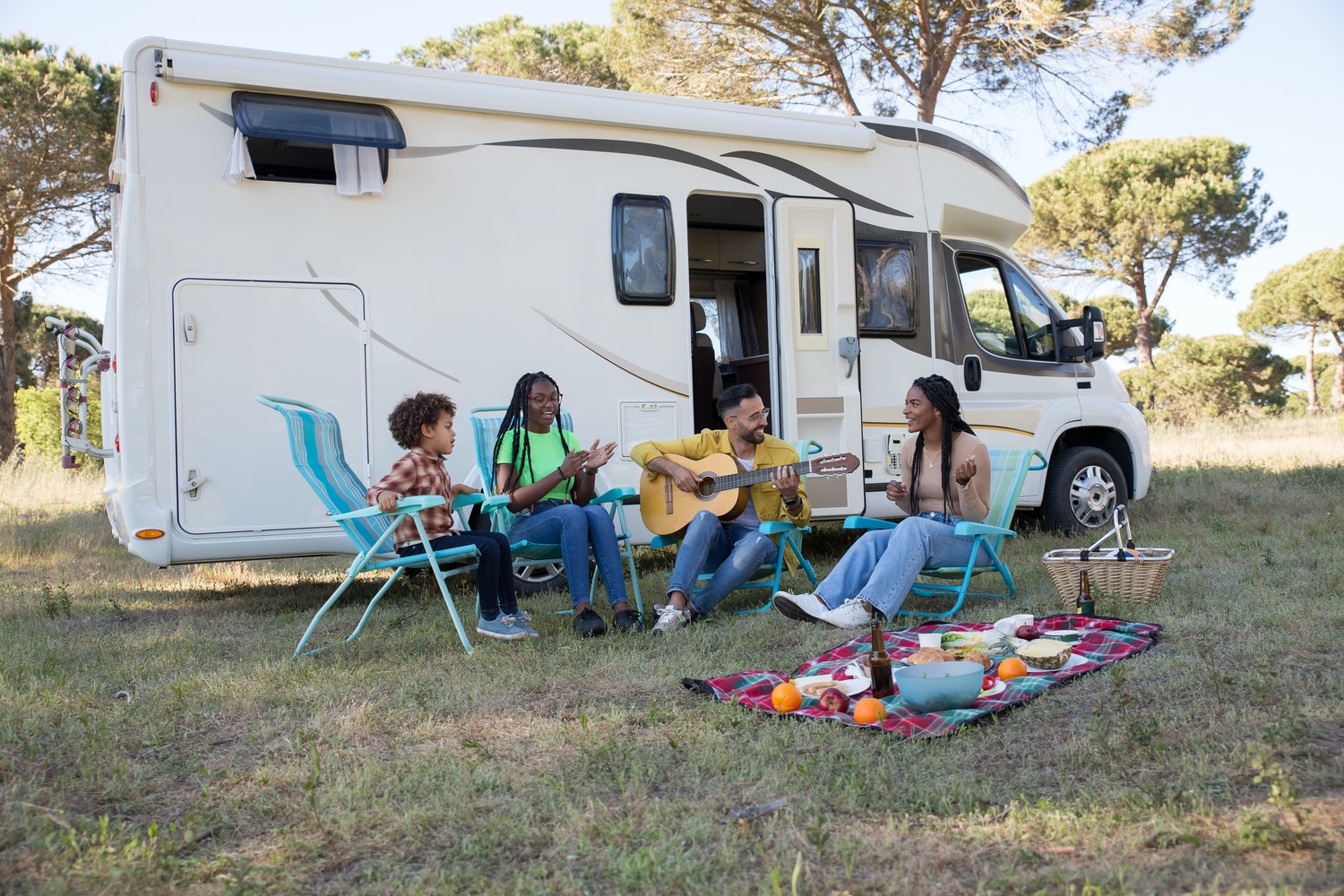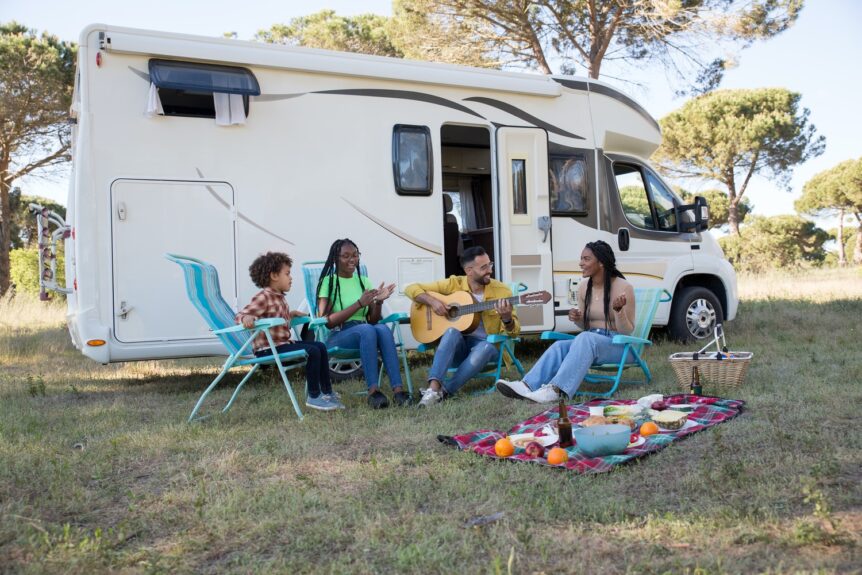What You Need To Know To Be an RV Trip Planner

One of the greatest draws of road tripping is escaping from the confines of your everyday life to explore somewhere new.
Sometimes this means giving up a certain level of control and comfort. Thankfully, when you travel by RV, you take some of your home comforts with you!
RV travelis a unique and incredible way to road trip, but it comes with equally unique challenges. More than any other kind of travel, an RV road trip across the USA and North America will require research, planning, and diligence.
Today we’re here to help with your RV trip planning. From discovering your needs to making the big decisions — all the while keeping the details in frame— this latest Autio travel guide has RV trip planning tools for everyone for veteran RVers and newbies alike.
Let’s get started!
Where To Start: Understanding Your Trip
Whether you’re used to driving by car, van, or even motorcycle, no other mode of road travel needs as much planning and preparation as an RV trip.
Plus, not every kind of trip is ideal (or even possible) with RV travel. While there are lots of benefits to RV travel and many unique opportunities, there are also some limitations.
That’s why today’s guide starts with the process of understanding your trip. Figuring out your needs, wants, and goals will go a long way towards making sure you’re happy from start to finish.
Budget
When it comes to RVs, you’ll find that being willing to invest some time and preparation can result in a more affordable trip than other modes of travel.
In terms of trip-to-trip budget, RV travel often incurs a lower cost. Campgrounds are generally less expensive than other types of accommodations at the same relative levels of luxury.
You can secure a spot at national parks for reasonable prices around or under $40 in most cases. There are also opportunities for free stays if you’re willing to explore “boondocking” or using public parking lots that allow camping, as many Walmarts do.
If you use an RV with cooking capabilities — or go camping and cook over the fire — you can save a significant amount of money compared to traveling by car and eating out for almost every meal.
Cooking while you travel offers an enhanced experience, too. Not only does the time you spend cooking offer unique ways to bring you closer to your travel mates, but you can also get a taste of the local land by purchasing produce from local farmer’s markets.
Level of Luxury
One of the biggest draws to RV travel is the ability to have comfort and even luxury at your fingertips. However, with each new amenity you add, there’s usually a cost or challenge added as well.
That’s not to discourage you from choosing comfort travel, but rather to prepare you for the process ahead!
As you work to understand your trip, ask yourself and anyone traveling with you what sort of compromises you are willing to make.
This is especially relevant when choosing your RV. Let's go over that in more detail below.
Choosing Your RV
Most road trips are relatively similar whether traveling by sedan, SUV, pickup, or van. However, when it comes to RV, the class you choose has a huge impact in terms of your capabilities and options on the road.
When planning your RV road trip, this decision is the most crucial in shaping your journey.
Whether you’re a new or experienced RV tripper, you may be surprised by the amount of detail and nuance separating all the RV claases.
Whether you’re traveling by motorcoach or towable is the first question. Motorcoaches are the independent vehicles that come in one piece, while towables aren’t going anywhere without another vehicle to pull them.
Each has a number of pros and cons. Towables aren’t accessible until you’re ready to bunker down — but once you’ve locked down your campground, you can use your personal vehicle to travel around the local area without your camper.
On the other hand, motorcoaches keep your comforts easily accessible, but they typically lack the convenience and flexibility you might want for exploring outside of camp and the main roads.
Motorcoach RVs are also distinguished by three classes: A, B, and C.
Class A
Class A rigs are the huge, bus-like vehicles that most likely come to mind when you think about RVs. These are often the most luxurious (and expensive), but they also come with plenty of unique challenges.
These giants are the least flexible of the RV classes, so your options regarding where to visit and camp with your vehicle will be greatly limited. Still, this is nothing a little extra diligent preparation can’t solve!
Do in-depth research or call ahead for every stop you make along the way – even gas stations – to ensure you don’t get stuck anywhere or have to turn around.
Class B
Class B RVs are generally the smallest of the motorcoach family. Often known as camper-vans, they’re the most flexible and fuel efficient but also the tightest on space.
This class might be perfect if you’re traveling alone or in a pair, but groups of 3 or 4 are likely to struggle with the tight spaces and limited storage. More than 4 people is going to be nearly impossible.
If you enjoy going with the flow, class B is likely for you. You’ll have the greatest access in terms of places you can fit. This means you can take your camper straight to the coolest campsites up in the mountains or into town (and convenient parking spaces) while you explore.
Class C
RVs in the C class have a very distinct silhouette, notable for the use of a regular truck chassis and the overhang above the chassis, which usually houses a bed inside.
These RVs are the middle ground between A and B. Most are capable of similar levels of comfort as moderate A rigs, but they offer greater maneuverability and fuel efficiency.
Plotting Your Route
Once you’ve gotten an idea of your your needs and selected your RV , it’s finally time to start plotting your route. The best RV road trips are the best-planned RV road trips. This is the exciting part, but there’s still work to be done to ensure you have an enjoyable RV road trip.
Aside from the typical aspects of good trip planning, here are some of the challenges and considerations unique to RVing across the country.
Slow Travel Time
Your GPS may tell you one travel time, but driving your RV will produce another. Generally, RVs are slower on the road — expect to go an average of 50 mph on major roads.
RVs also take more time for food and gas stops thanks to more difficult parking and larger tanks. You should account for setup and breakdown time estimates at your camps along the way each day, too.
Plus, your route planner should be aware of RV-specific services available along your routes like dump stations, truck stops, and places for repairs. Google Maps can be extremely helpful, but the best RV trip planners will have everything printed out, just in case. It's always better to be safe than sorry!
Road Conditions
Exploring is an enticing venture. Still, with Class A and sometimes Class C RVs, you’ll need to be mindful about what kind of roads you're driving on.
Winding roads with steep curves, angles, or switchbacks can pose a very serious problem for oversized RVs. You'll also want to note any areas with steep grades and low clearances. Try to stick to main roads and do some research to find RV-friendly routes.
Restrictions
Like road conditions, you’ll also need to be aware of any potential restrictions that may prevent you from progressing on your journey and lead to a long, awkward, frustrating detour.
The most important restriction to be aware of is bridge height. Propane restrictions in tunnels or across bridges are occasionally relevant too, if you’re hauling propane tanks.
Weight
Once you’re loaded up, head to a weigh station to make sure you’re within regulations and safe to drive!
Accounting for Other Details
At Autio, we love spontaneous trips. However, if you’re hoping to park your RV in a campground, take note that most campgrounds are booked to the brim in, often up to a few months in advance.
It’s important to plan your RV trips ahead by some time — unless, of course, you get lucky. There are extensive resources to search all the different campgrounds, state parks, and RV parks that may be available along your route and to make reservations for yourself.
Don't forget to look up campground reviews while planning your best route, so you can find nightly stops with all the amenities you need for a comfortable journey. Knowing important stops like roadside attractions, wineries, and casinos can help you narrow down the RV route you take to your final destination while still leaving plenty of room for adventure.
Once all your planning is finished, you finally get to enjoy the trip itself. Optimize your experience by adding Autio to your travel loadout.
Autio is a location-based audio platform perfect for roadtrippers and RV enthusiasts.
What does that mean? Think of our smartphone app as your personal tour guide that speaks up when there’s something interesting around you. Based on your location, you’ll receive notifications offering audio clips from our huge archive, narrated by your favorite voices.
Topics range from history, pop-culture, music, geography, and more. When you download our app on iOS or Android, there’s something to interest, entertain, and educate everyone in your travel party.
Stay curious and inspired with our Autio audio companion and see what gems the places you go have to offer!
Conclusion
RV vacations can be extremely enjoyable and rewarding, provided you put in the work to plan your trip properly. Now, you're an RV trip wizard ready to take on whatever the road throws at you. Who knows — maybe you'll want to become a full-time RVer.
Combined with the inspiration and entertainment you’ll get from our Autio stories, your next RV trip is set to be the best one yet.
For all things road trip and lifelong learning, stay tuned to our Autio blog and website!
Sources:
A guide to the 8 types of RV explained, from Class A to camper vans | Business Insider
Boondocking | Macmillan Dictionary Blog
The history of Recreational Vehicles: From the 1800s - today | History Cooperative
 We'd love to hear from you
We'd love to hear from you
 We'd love to hear from you
We'd love to hear from you